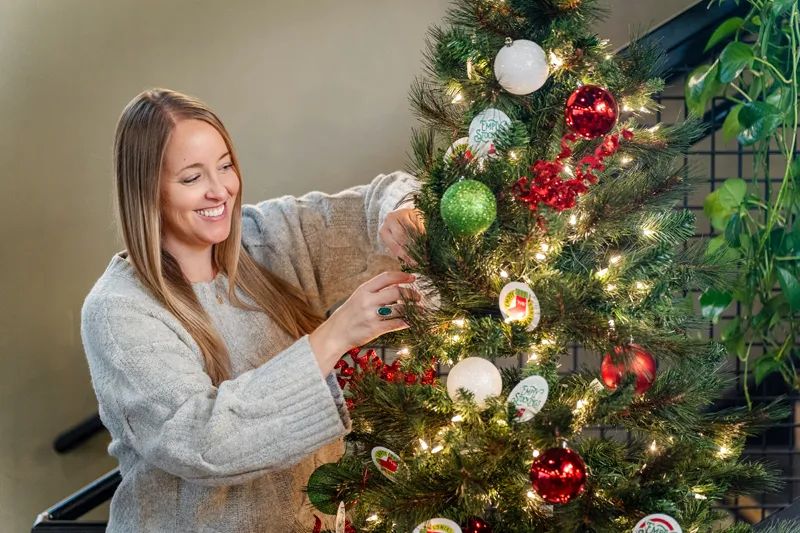
Unwrapping Love
For children in crisis, Jenn Weber ensures Christmas still comes
The back seat of Jenn Weber’s Chevy SUV is piled so high, you can barely see light streaming through the back windshield. It’s crammed with stuffed animals, stacks of books, musical toys that start playing when she hits a bump and even a brand-new bike wedged into her rig sideways. It’s late December and as Jenn drives across town to pick up carload after carload of donated gifts, she’s on a mission to help deliver Christmas to foster children who might otherwise not have one.
With every pickup, she takes a second to soak in the community’s generosity.
“Half the time, I drive back to the office tearing up,” she says. “It’s insane.”
You could call Jenn “Santa” for the 400-plus children who will rely on the program known as Empty Stockings to get a little love during the holiday season. While Jenn orchestrates things as a supervisor with Child and Family Services, there are lots of “elves” to help. Social workers gather Christmas wishes from the children they serve. Wishes are posted on the Yellowstone Valley Woman website (and printed, in part, on page 54-55). There’s even a tree at Meadowlark Brewery that hosts wishes in festive fashion. It’s Jenn’s job to keep the process meticulously organized and streamlined.
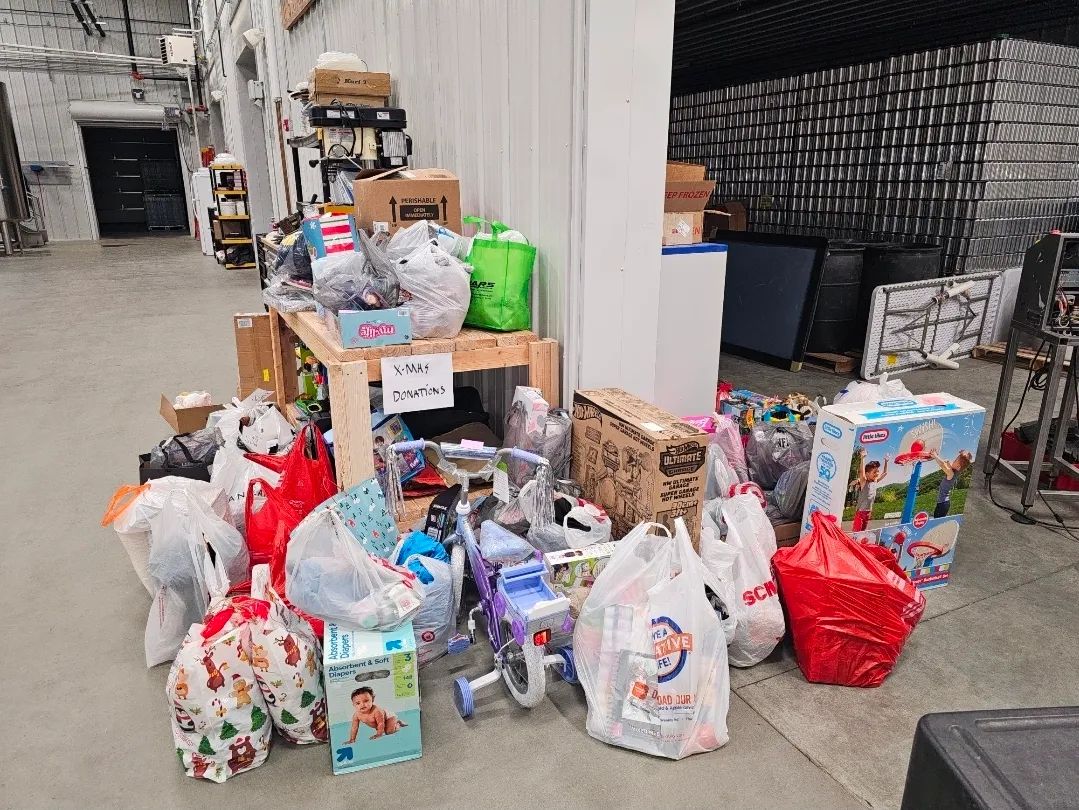
Four years ago, when she was told the department would no longer have the Empty Stockings program as a way to deliver Christmas presents to children in foster care, she made the mad scramble to find a solution. The program’s original community sponsor bowed out after more than four decades of running the program.
“The email said that this was a pet project of someone who no longer works there and, so, they wouldn’t be doing it again,” Jenn says. Empty Stockings was canceled, and social workers were urged to try to find other resources.
“I said, ‘can we hold off on calling this off? Can you give me a minute?’” she remembers saying. “I don’t like a problem without spending some time on a solution, especially something that big.”
As a social worker, she’d gathered wishes before but had never been deeply involved in the program, let alone taken the time to organize it from the top down.
That’s when Jenn turned to Yellowstone Valley Woman and me (Julie) for help.
“I called you and said ‘I have a problem.’ I remember you saying, ‘Just tell me what to do.’ I don’t think we even talked all the way through it,” Jenn says. “We just dove in that first year to wing it.”
YVW had already printed the magazine, which meant all that was left to use was the publication’s website and social media.
“By the first week of December panic set in when we realized only 60 of the program’s 400-plus stockings were filled,” Jenn says.
That’s when we called the woman who we knew, without a shadow of a doubt, could energize our efforts — Karen Grosz. After all, we thought, doesn’t this woman, who built a business on networking, know pretty much everyone in Billings?
“The initial call felt devastating,” Karen says. “We were given an impossible, improbable task, one that we couldn’t fail to complete. And, so, we did what people do in a crisis. We pulled together, called everyone we could think of and watched one miracle after another fill the stockings.”
Karen says she will never forget the magic that followed. It was Dec. 23, just minutes before the offices at Child and Family Services were set to close. She was dropping off the last load of gifts she had rounded up.
“As I stood in the elevator, a grandma told me what these last-minute gifts would mean to the children she had just taken custody of,” Karen says. “They would have gifts to open. Our small act of love was magnified to joy, just like that.”
“It was chaos, but we did it,” Jenn says. “There was not a child on that list who went without Christmas that year.” She laughs as she says, “How did we survive that season?”
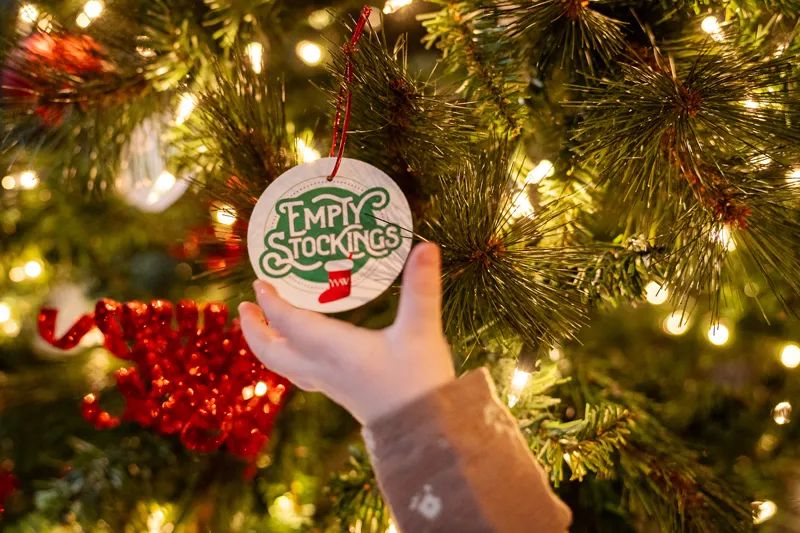
Each year since, by early December, every inch of the Child and Family Services conference room turns into a makeshift toy store. Gifts donated and not designated for any child in particular are staged for those children who might find themselves in the foster care system even days before Christmas.
“We can go there and shop and make sure that, even if it is Christmas Eve, there is a way to sneak a little Christmas in for a child,” Jenn says.
Knowing how special holidays are for families, she makes an extra effort to think of kinship families, even birth parents.
“Not all of our kids automatically go into foster care, but these relatives step up with no notice to take on maybe a set of siblings who they love and who are part of their family but they weren’t planning to take over raising for a little while,” Jenn says. “To also have Christmas right around the corner is so financially challenging.”
She makes sure birth parents working on reuniting with their children have a gift to share as well. “That way, they still get to be a part of that magic, even if they aren’t waking up with their kids on Christmas morning,” Jenn says.
Keep in mind, when she takes on the role of Santa, her workload doesn’t stop and wait for her. She oversees five social workers who each have a caseload of up to 25 kids. For Jenn, there is no clock out. Whether it’s a midnight call about a child in crisis or a teen who just needs to hear someone say, “I’m still here,” Jenn always answers.
18-year-old Teyana is one of those teens. She had been in Jenn’s care for seven years before aging out of the system. When Jenn took her case, Teyana’s previous social worker was leaving the department. She and her sister were close to being placed with an adoptive family. All Jenn had to do was wrap up the case. To this day, even after the adoption fell through, Jenn is still involved in the girls’ lives. Teyana was just 11 years old when she met Jenn. Her sister was 13.
“She is my biggest support in a lot of ways,” Teyana says. “She’s someone who has been there for me like a mother.”
Teyana and her sister were removed from their family due to their mother’s substance and physical abuse. “I had called the cops on my mom. My mom would get drunk and hit me,” Teyana says.
Jenn says she’s been able “to just love them through some really vulnerable things. There have been a lot of really unfortunate things that led to their case still being open.” Over the years, Jenn admits she’s been offered jobs outside the department. She always turned them down. “I couldn’t walk away from the girls before they were out of the system. That’s part of why I never leave,” Jenn says.
She loves her role as a mentor to them.
“These kids don’t have a lot of other people in their corner. I get to be a part of the ups and downs and the good and bad,” she says. When Teyana recently had her high school senior pictures taken, Jenn was by her side.
“Even though I am aging out of the system, she still helps me,” Teyana says. “She told me, ‘I will still be here for you.’”
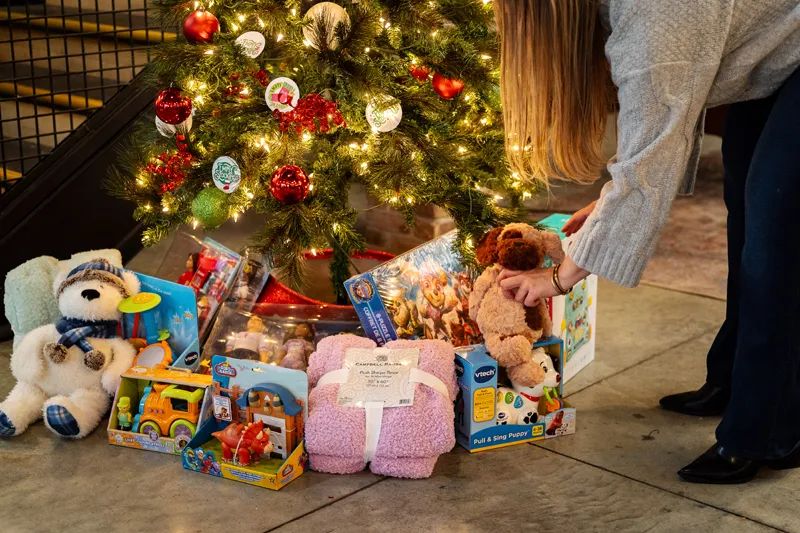
It’s that kind of dedication that landed Jenn on both the Indian Child Welfare Act (ICWA) Court and ICWA Recovery Court, helping those caring for Native American children to find the best possible solution for each child-welfare case. Since Native American children make up more than a third of all foster care cases but are a little less than 7% of the population, the court, which was the fourth of its kind nationwide, brought a team together to help find solutions.
“Jenn’s heart is in the right place for this type of very hard work,” Yellowstone County District Judge Rod Souza says. He oversees both courts and has, since their inception. “She’s not antagonistic with parents. She is very creative, looking for great outcomes for children. It’s problem solving and I see it happen with Jenn all the time in my treatment court.” He goes on to add, “You can see that she really cares about the people that she is working with.”
Helping families is her passion, Jenn says simply. “Magic has happened in that court. You can sit in your office and say ‘I wish this was different,’ but being a part of team of people who call themselves agents of change is really powerful.”
Both programs are helping to better collaborate with neighboring tribes and creating a cultural shift when it comes to caring for these children.
Heather Webster, a deputy chief county attorney for Yellowstone County, is assigned to manage the Child Abuse and Neglect Division. She’s worked side by side with Jenn since the ICWA court started seven years ago and has seen Jenn’s heart for children firsthand.
“I love her open and curious spirit,” Heather says. “She is always wondering what can we do differently and what can we do better. She is always open to trying new pathways.” Heather calls Jenn an unsung hero for children. “You always trust she has their best interests at heart.”
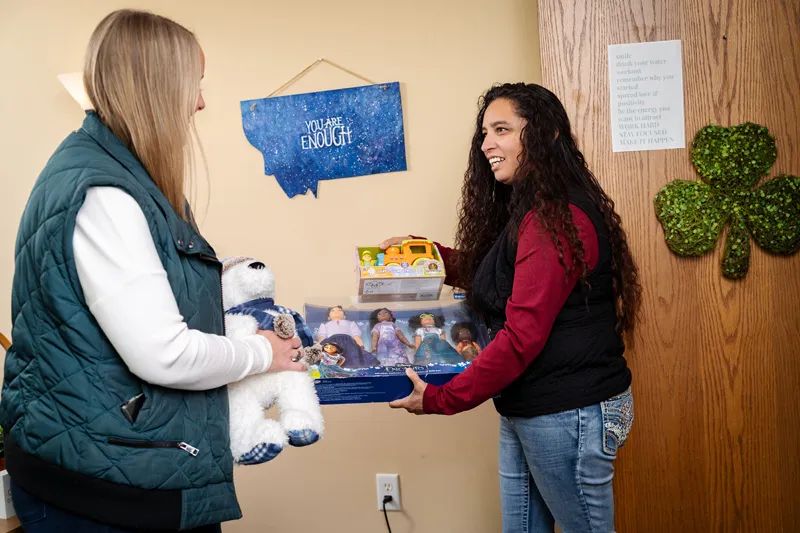
Since Jenn was little, she always knew she wanted to work with children. Her mother spent 30 years working in child care and all Jenn wanted was to turn 16 so she could work at the same day care. When she got to college, she started off as a childhood education major before realizing she wanted to make a different impact.
“I wanted to help kids more than I wanted to teach them,” she says. “I wanted to be able to love on them and help solve problems.”
After spending a few years working for both Youth Dynamics and the Yellowstone Boys and Girls Ranch, she became an intake social worker investigating cases of abuse and neglect for Child and Family Services. Within a year and a half, she became a supervisor. Shortly after, she started supervising social workers who follow cases through the system and work with families on reunification. That’s when she really hit her stride.
“I realized my passion is helping other people do their jobs really well, teaching, giving feedback and challenging people to grow,” she says, smiling.
The entire department was challenged four years ago when a new director took over the department statewide. Jenn credits Nikki Grossberg’s focus on preventative social work for reducing each social worker’s caseload and providing a better safety net for kids.
Today Jenn oversees the cases of about 125 children spread out over five workers. Four years ago, she was supervising six social workers who each held a caseload of no less than 60 children.
“It was terrible,” she says. “I was directly responsible for 360 kids. It was terrifying.”
Jenn gives an example of the night and day difference in how the department operates today.
“If we can wrap a family with services or move grandma into the home with what we call a safety plan, we can tell a family, ‘Grandma is going to live with you for 30 days to see if we can get this under wraps or get you enough help to stabilize.’”
That kind of creative thinking, Jenn says, is reducing not only the caseload but the number of cases where parental rights are permanently revoked.
“Now, we can say, ‘What’s your next step? How can I help you do that?’, instead of just saying, ‘Fix it. You have 30 days,’” Jenn says.
Even with a newfound positivity and more focus on prevention, there are still dark days.
“We see the worst things you could possibly imagine happening to children and families, the worst struggles that you can’t imagine related to addiction, mental health and homelessness,” Jenn says. “We see families at their very, very, very rock bottom.”
This year brought one of the worst child abuse cases Jenn has seen in her career. With every tough case she experiences, she always searches for a silver lining.
“The only silver living for the first few days, it was awful enough that my worker had to step away from it for a while. But, as awful as it was, I could step in and help,” she says. “I agreed to take on the terrible and carry it those few days so that she could breathe before she jumped back in. That was the only silver lining.”
The work, at times, takes a toll on Jenn’s body.
“I have a lot of autoimmune health issues and so, when that stress is constant and I don’t take breaks and decompress, eventually my fatigue and body aches get really hard,” she says. “I try to be mindful of it.”
She credits therapy every other week to keep her grounded and, surprisingly, the four-legged baby she adopted two years ago named Burrito.
“He was rescued from an apartment in Texas,” Jenn says about her adopted 4-year-old Pitt Bill. “He was left out on the patio, not fed or watered for days on end. He was skin and bones. I don’t know if anyone knows the intricate details but it was pretty severe neglect.”
Her friends tease her and have told her, “Of course, you are going to get a dog with a ridiculous amount of trauma.” She is quick to say, “I just have that capacity to be patient with people and animals that have been through all the things. They come into my life for a reason, but it is always healing in both directions.”
Knowing she has her “tiny tornado” waiting for her at home, gone are the constant days of staying at work until after the sun goes down. The nightly cleaning crew no longer wonders where she is. They know she’s at home.
“It was meant to happen,” she says about Burrito. She laughs as she adds, “He’s the biggest love bug. He will snuggle so hard he wants to be inside your skin.”
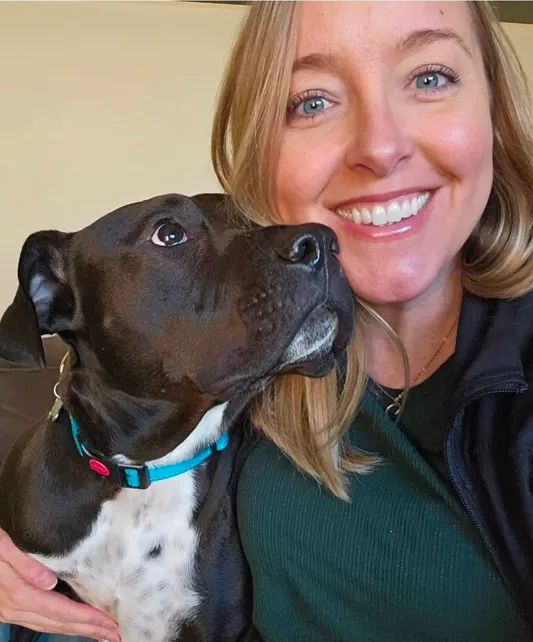
When the calendar moves closer and closer to December, Jenn gets another jolt of love. It’s a time when she can help spread joy to families and children who desperately need it. And, she gets to do it with the backing of an entire community.
“It’s insane what this community does to show up for families at Christmas,” she says. “I just can’t wrap my head around the generosity at times.”
She’s watched families begin to cry as they take packages from her in their driveway. She’s watched teens who are aging out of the system be amazed when the community helps outfit their new apartment with everything they need but could never afford on their own. She makes sure when those gifts are shared that she gives each teen some words of wisdom as well, saying, “Look how much our community did for you. All of these people believe you can do it and they want to help you.”
As she looks ahead to this year, Jenn’s Christmas wish is simple.
“My absolute dream would be that every wish is filled and that it is filled with time to be really intentional with each child,” she says. She knows the work it takes for each social worker to deliver gifts to their entire caseload. Sometimes gifts need to be mailed. Other times, they have to be driven to homes outside the city limits. There’s a ton of coordination.
When every last gift has been delivered, however, she often wonders what Christmas looks like for the foster children now nestled into safer homes. She hopes each gift comes with an underlying feeling for each and every child.
“You are loved. That’s it,” Jenn says, tears welling up in her eyes. “We love them. Foster parents love them. Birth parents love them. Kinship families love them. They are loved not because they are in foster care. They are just loved.”











